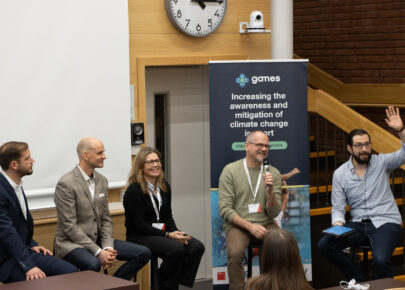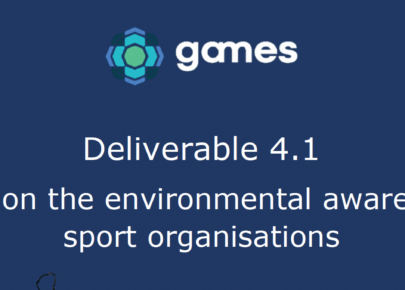Racing towards sustainability: A closer look at World Athletics Championships Budapest 2023’s environmental initiatives
The World Athletics Championships Budapest 2023 is taking a significant step forward in recognising the importance of sustainability in event delivery. Collaborating closely with the event’s organisers, World Athletics – a GAMES project sport partner – has introduced a series of initiatives aimed at minimising the environmental impact of the championship while also contributing positively to the local community.
Over the course of the next two weeks, as the world’s athletes converge in Budapest, these initiatives promise to offer not just thrilling athletic performances, but also meaningful strides towards a more sustainable future.
One notable milestone achieved by the organisers is their full embrace of the Athletics for a Better World standard. Developed by World Athletics, this standard acts as a guide to evaluate the sustainability of events. It aligns with the United Nations’ Sustainable Development Goals, and, guided by the World Athletics Sustainability Strategy 2020, addresses global challenges such as climate change, air pollution and inequality.
By adopting this standard, the Local Organizing Committee (LOC) of the championships is not only elevating the current event’s sustainability but also contributing valuable insights to shape the sustainability baseline for future World Championships.
At a local level, the LOC’s sustainability goals are twofold. It is striving to create a health and wellbeing legacy by encouraging Hungarians to engage in more physical activity, thanks to incentive programmes linked to the World Athletics Championships. Additionally, the LOC is committed to driving urban regeneration, as evidenced by the launch of an urban forest regeneration project. This project serves as the inception of a global network of World Athletics Championships Legacy Forests, underscoring a commitment to environmental stewardship and lasting impact beyond the event’s conclusion.
The efforts in Budapest 2023 extend beyond intentions, with a comprehensive waste management plan in place. This is complemented by a campaign urging spectators to opt for public transportation, demonstrating a pragmatic approach to reducing the event’s carbon footprint.
One instance of this is the replacement of single-use plastic bottles with water refill stations in the broadcast compound and media centre. This switch is projected to prevent 342,000 single-use plastic bottles from entering circulation during the event, a clear step toward reducing plastic waste.
Furthermore, the organisers are dedicated to fostering inclusivity through an elaborate plan to enhance accessibility, diversity and inclusion. An inclusive programme aims to make the event accessible to a wider range of individuals, creating an environment that celebrates diversity and participation.
In an era of digital connectivity, the World Athletics Congress 2023 stands as an example by being predominantly conducted in a digital format. This decision eliminates the need for vast amounts of paper, highlighting the event’s commitment to sustainability and efficiency.
The impact of climate change takes centre stage through two live-streamed panel discussions during the championships. The ‘Sport on the Climate Change Front Lines’ panel on 21 August explores the vulnerability of Pacific Island nations to climate change effects. This serves as a platform for discussing the real-world implications of climate change on sports and communities.
On 25 August, the ‘Building Collaborations for Sustainable Events’ panel gathers experts to discuss aligning World Athletics’ sustainability strategy with the aspirations of the Budapest LOC. The conversation will delve into the role of major events in setting sustainability examples and explore expectations of partners and sponsors in promoting sustainable practices.
The LOC has set up a designated Green Zone within the stadium park. This zone will host activities aimed at raising sustainability awareness, including daily quizzes with prizes and meet-and-greet sessions with athletes. This initiative bridges the gap between sports and sustainable living, encouraging participants and spectators alike to adopt eco-friendly practices.
A collaborative active mobility study, managed by the Health & Science Department and Sustainability team, assesses the benefits of active travel, particularly cycling and walking, during large sporting events. Over a two-week period, more than 150 participants will walk, cycle and run to the Hungarian National Athletics Centre, evaluating the impacts of active travel on local motor vehicle traffic, greenhouse gas emissions and economic benefits.
The study also aims to measure how event organisers can reduce their own transport footprint by encouraging active travel on-site. Financed in part by the GAMES project, a European Union Erasmus+ initiative, the study involves World Athletics staff, service providers and LOC volunteers, with findings to contribute to sustainability initiatives in future World Championships.
“The World Athletics Championships Budapest 2023 presents more than just a display of athletic prowess, it serves as a platform for advancing sustainable practices and initiating discussions about climate change and inclusion,” said Bob Ramsak, World Athletics’ Head of Sustainability and GAMES project representative.
“The organisers’ holistic approach, encompassing waste reduction, urban regeneration and inclusivity, sets a commendable example for responsible event management. By weaving sustainability into the fabric of the championships, this event showcases the potential of sports to drive positive change for a better, more sustainable world.”
World Athletics President, Seb Coe, added: “I’m particularly pleased that these are the first World Championships to be held under our sustainability strategy. That matters to me, and I know it matters to 75-80% of the athletes because in recent surveys they have made it clear that climate change and sustainability issues really matter to them. And I’m particularly delighted that the legacy for these championships has a real focus on physical activity.”






